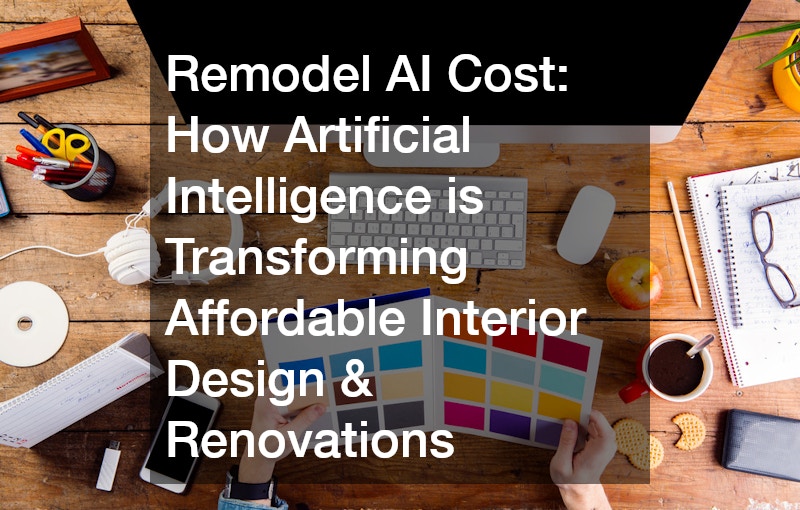Interior design and home renovations have always been exciting yet challenging journeys. Between balancing budgets, coordinating schedules, and making design decisions, homeowners often feel overwhelmed by the complexity of remodeling. However, artificial intelligence (AI) is now reshaping the way these projects are approached. With data-driven insights, AI reduces errors, streamlines workflows, and provides cost-effective solutions. It is also revolutionizing how general contractors, electricians, and home builders manage projects, making remodels more affordable and efficient.
What Are the Benefits of Using AI in Interior Design?
AI brings an array of benefits that touch every aspect of the design and renovation process, from creativity to efficiency. One of the most exciting advantages is how AI enhances creativity by generating unique design concepts based on global data, inspiring both homeowners and professionals to explore styles they may not have considered. This allows for more personalized spaces, whether it’s a sleek modern kitchen remodel or a cozy, rustic living room.
AI also streamlines project management by integrating tasks such as scheduling, budgeting, and communication into a single platform. General contractors, electricians, and designers can collaborate more efficiently, reducing delays and costly misunderstandings. Beyond logistics, AI improves cost-effectiveness by analyzing material pricing trends, energy usage, and labor needs, helping clients achieve more within their budgets while lowering remodel AI cost.
Another significant benefit is efficiency. Repetitive tasks like drafting floor plans, measuring spaces, or creating 3D models are automated, allowing professionals to focus on design quality and innovation. Finally, AI provides personalized design solutions by analyzing client preferences, lifestyle habits, and even local climate factors. The result is a customized, functional, and affordable design process that makes interior renovation more accessible than ever.
Enhance Creativity and Innovation
AI platforms provide endless inspiration by analyzing millions of global design references. For a homeowner dreaming of a kitchen remodel with granite countertops or custom cabinetry, AI can suggest color palettes, layouts, and finishes that combine beauty with functionality. Similarly, it can propose bold styles for bathroom remodeling or generate options for accent walls that pair well with local residential painting services.
Streamline Project Management
Managing renovation projects often involves coordinating multiple professionals such as general contractors, electricians, and flooring specialists. AI streamlines this by offering integrated project management tools. It keeps track of timelines, labor schedules, and materials, ensuring smoother communication across the team and reducing delays.
Improve Cost-Effectiveness
AI analyzes material pricing trends, energy costs, and labor rates. For example, when selecting between hardwood and laminate for local floor restorations, AI can calculate not only upfront expenses but also long-term maintenance savings. This ensures homeowners receive the best value, directly impacting remodel AI cost.
Increase Efficiency and Productivity
AI automates technical aspects such as drafting floor plans or generating 3D visualizations. Designers and general contractors save time on manual tasks, enabling them to focus on critical work such as hiring skilled electricians or selecting materials for commercial floor coatings.
Provide Personalized Design Solutions
Whether someone is updating their home with new windows for energy efficiency or working with a home builder on a custom layout, AI tailors solutions to their lifestyle. It might suggest durable granite countertops for families who cook frequently or recommend soft pastel hues from local residential painting services to create a calm and inviting atmosphere.
How Does AI Reduce Costs in Home Renovations?

The financial benefits of AI are especially relevant for homeowners and businesses seeking affordable yet high-quality results.
Predictive Cost Analysis
AI generates detailed cost breakdowns for entire projects. Before a kitchen remodel begins, the software can forecast costs of appliances, cabinetry, granite countertops, lighting, and even hiring an electrician. Clients get transparency from the start, preventing budget surprises.
Optimized Resource Allocation
Instead of paying a home builder to guide every choice, AI can point you toward smart savings. In bathroom remodeling, it might suggest recycled tiles or cost-efficient fixtures that still hold up well. For local floor restorations, AI calculates the right amount of finish needed, helping you cut waste and extra costs.
Minimized Human Error
Errors like mismeasured flooring or incorrectly installed new windows can be costly. AI reduces these risks with accurate digital measurements and real-time validation. This helps general contractors avoid rework, saving both time and money.
Energy Efficiency Solutions
AI evaluates how upgrades such as new windows or smart HVAC systems reduce energy consumption. This lowers long-term utility bills, which is particularly appealing for clients investing in eco-friendly kitchen remodel projects.
Declining Labor Costs
Automated planning and visualization mean fewer hours spent on revisions and manual drafting. With AI shouldering part of the workload, general contractors and electricians can focus their efforts on execution, lowering overall labor costs.
What AI tools are available for designers?
Designers and contractors now have a wide range of AI tools at their disposal, transforming how projects come to life.
AI-Powered CAD Software
Advanced CAD software enhanced with AI generates floor plans in seconds, adapting instantly to client requests. For projects such as commercial floor coatings, it can simulate how surfaces will wear over time, helping clients make informed choices.
Virtual Reality Design Simulations
VR powered by AI enables homeowners to walk through a proposed bathroom remodeling project or test paint colors before hiring local residential painting services. They can experience a kitchen remodel virtually, complete with granite countertops and new lighting fixtures.
Augmented Reality for Client Demos
AR apps allow clients to visualize design updates in their actual spaces. Whether previewing new windows or evaluating furniture placement, AI ensures these demos are realistic and interactive.
AI-Driven Trend Prediction Tools
Designers stay ahead of trends with AI-driven insights. For example, if soft, natural tones are trending, local residential painting businesses can align their services to client demand. Similarly, home builders benefit by integrating popular layouts into new construction projects.
Smart Inventory Management Solutions
For general contractors managing multiple sites, AI-powered inventory systems forecast material needs. From ensuring sufficient supplies for local floor restorations to tracking paint for residential or commercial projects, AI reduces waste and delays.
How AI Is Transforming Sustainable Design
Sustainability is a growing priority in both residential and commercial remodeling. AI is driving progress in this area.
Sustainable Material Selection
AI recommends eco-friendly options such as recycled countertops or sustainably sourced wood for cabinetry. In bathroom remodeling, it might suggest water-saving fixtures, while for kitchen remodels it can recommend energy-efficient appliances.
Energy Consumption Modeling
AI models energy performance for upgrades like new windows, ensuring homes remain well-insulated and energy bills stay low. Electricians can use AI data to install optimized lighting systems for reduced consumption.
Waste Reduction Strategies
By predicting exact material requirements for local floor restorations or granite countertops, AI prevents over-ordering. This reduces both costs and environmental impact.
Green Building Assessments
AI-powered platforms evaluate remodels against green building standards. Home builders and general contractors can demonstrate compliance with eco-friendly practices, appealing to environmentally conscious clients.
Smart Home Integration
AI integrates smart systems that manage lighting, temperature, and security. These features not only save energy but also increase property value, making them attractive for kitchen remodels and full home renovations.
How Is AI Changing Client-Designer Relationships?

AI is strengthening collaboration between clients and design professionals.
Enhanced Collaboration Tools
Cloud-based platforms allow homeowners, general contractors, electricians, and designers to work together seamlessly, reducing miscommunication.
Real-Time Feedback Mechanisms
Clients can instantly respond to AI-generated design options, whether it’s previewing bathroom remodeling layouts or testing commercial floor coatings.
Client-Centric Design Customizations
AI ensures designs reflect client lifestyles. Families may prioritize durable granite countertops, while others may seek low-maintenance solutions such as vinyl for local floor restorations.
Efficient Communication Channels
Virtual assistants powered by AI answer client questions instantly, such as cost estimates for new windows or scheduling updates for local residential painting services.
Transparent Project Tracking
AI dashboards give clients visibility into timelines and budgets. They can track progress on everything from a kitchen remodel to larger construction projects managed by home builders.
What Are the Challenges of Implementing AI in Design?
Despite its advantages, AI in remodeling faces some obstacles.
Initial Cost Barriers
AI tools and software may have high upfront costs, which can be challenging for smaller general contractors or independent local residential painting businesses.
Technology Adoption Resistance
Some professionals may resist AI, preferring traditional design methods. A seasoned home builder, for instance, may hesitate to rely on AI predictions without hands-on experience.
Data Privacy Concerns
Personal data collected for AI-driven personalization—such as preferences for bathroom remodeling—must be safeguarded to maintain client trust.
Integration with Traditional Techniques
AI insights must be balanced with human craftsmanship. While AI can suggest granite countertops, it is skilled general contractors who bring the vision to life.
Skill Gap in the Workforce
Training is essential to help professionals—from electricians to floor restoration specialists—adapt to AI tools and maximize their potential.
Is AI affordable for small-scale projects?

AI is increasingly accessible, even for modest renovations.
Budget-Friendly AI Tools
Subscription-based AI software provides affordable access to powerful design tools for homeowners planning small kitchen remodels or simple bathroom remodeling.
Scalable AI Solutions
Homeowners can use AI features selectively, whether for local floor restorations, local residential painting, or installing new windows, keeping costs manageable.
Community-Based AI Resources
Online communities share free or low-cost AI templates for general contractors, electricians, and home builders, lowering barriers to entry.
DIY AI Design Kits
Some AI platforms are designed for homeowners who want to explore ideas before hiring professionals. This is useful for DIY bathroom remodeling or experimenting with granite countertop selections virtually.
Economic Impact Analysis
By lowering remodel AI cost and making services like local floor restorations or commercial floor coatings more efficient, AI is democratizing design for a broader market.
How AI Shapes Design Trends
AI not only predicts but actively shapes design movements.
Real-Time Trend Monitoring
AI identifies growing preferences, such as demand for eco-friendly kitchen remodels or bold accent colors in local residential painting.
Data-Driven Style Predictions
By analyzing purchasing patterns, AI forecasts material choices like granite countertops or smart appliances.
Influencing Consumer Preferences
AI recommendations influence clients by presenting curated options, encouraging adoption of features like energy-efficient new windows or custom bathroom remodeling solutions.
Social Media Trend Analysis
By analyzing platforms like Pinterest, AI identifies the rise of textured walls or luxury flooring, guiding both local floor restorations and commercial floor coatings.
Global Design Influences
AI removes borders by incorporating international styles into local projects, enabling home builders to offer globally inspired layouts.
What Future Advancements Can We Expect From AI in Home Design?
The horizon for AI-driven remodeling is vast and full of possibilities.
Integration with IoT
Homes will adapt in real time through AI and IoT integration, with systems adjusting lighting, temperature, and even security based on occupant habits.
Advanced Machine Learning Algorithms
Design suggestions will become more precise, tailoring layouts for everything from kitchen remodel projects to commercial floor coatings.
Robotics in Construction
Robots, guided by AI, may soon assist general contractors and electricians in tasks like flooring installations or electrical wiring.
Artificial Emotional Intelligence
Future AI could read emotions, creating designs that uplift moods. For example, recommending calming bathroom remodeling layouts or energizing color schemes from local residential painting services.
Biophilic Design Innovations
AI will advance nature-inspired interiors, guiding home builders in adding green walls, natural light optimization, and eco-friendly flooring.
Are There Any Ethical Considerations With Using AI in Interior Design?

Ethics must remain central as AI expands in remodeling.
Algorithmic Bias in Design
AI could unintentionally favor limited aesthetics, reducing cultural diversity in design recommendations.
Ownership of AI-Generated Designs
Questions remain about whether AI-generated concepts belong to the client, the designer, or the software developer.
Impact on Employment
Widespread AI adoption may reduce certain manual roles, raising concerns for electricians, painters, and contractors. Balancing technology with employment opportunities is essential.
Ensuring Accessibility and Inclusivity
AI must be designed to accommodate diverse needs, ensuring everyone—from small homeowners seeking local floor restorations to large businesses planning commercial floor coatings—can benefit.
Responsible AI Implementation
AI should enhance human creativity rather than replace it, keeping designers, general contractors, and home builders at the heart of the remodeling process.
Artificial intelligence is revolutionizing the renovation and design industry, from large-scale commercial projects to small kitchen remodels. By optimizing resources, predicting costs, and fostering sustainability, AI lowers remodel AI cost while expanding creative possibilities. Services once considered luxuries—like granite countertops, bathroom remodeling, or custom local residential painting—are becoming more accessible.
General contractors, electricians, and home builders are discovering that AI enhances their work rather than replacing it, allowing them to deliver more precise, efficient, and affordable outcomes. From new windows that cut energy bills to commercial floor coatings that extend durability, AI is creating smarter, more sustainable spaces for modern living.
As AI continues to evolve, it will reshape not only the way we design and build but also the way we experience our homes and workspaces. The future of remodeling is here—personalized, data-driven, and cost-effective for everyone.



